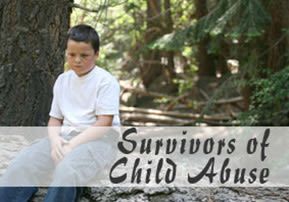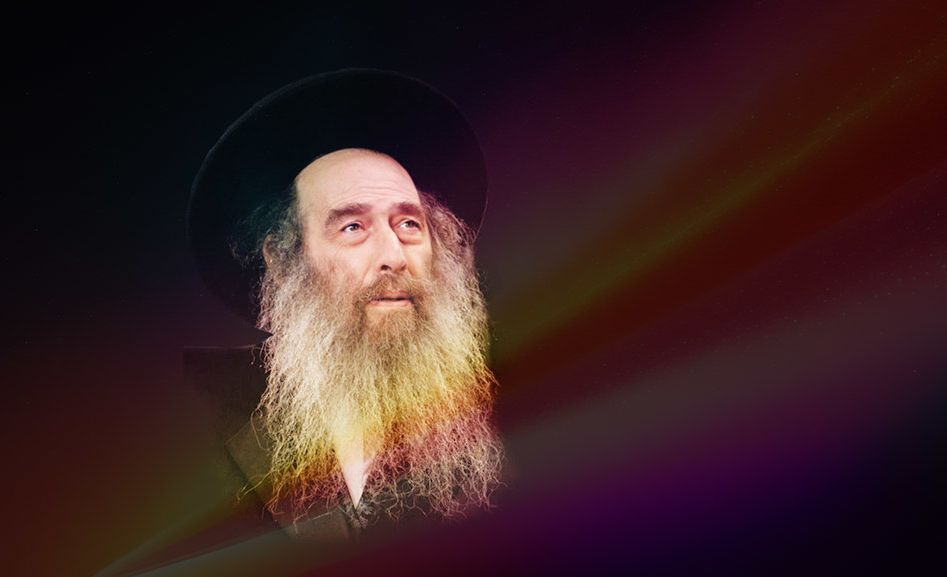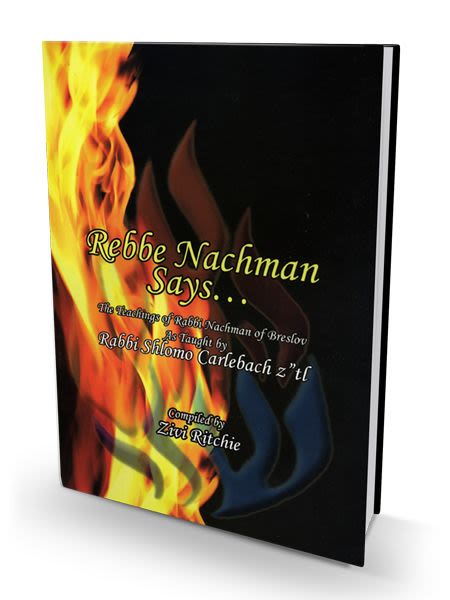
Survivors of Child Abuse
There’s a lot that a person can do to be supportive of a child-abuse victim; the best possible thing we can do is to prevent it from happening in the first place...

There are those, like Shua Finkelstein, to whom we cannot be supportive anymore.
Shua left our world this year, from Lakewood, New Jersey, after overdosing at age nineteen, and after disclosing to his family and friends that he had been abused – repeatedly – as a child. If we can support all those that are still surviving, though, we can continue to help bring an aliyah to Shua’s pure neshama.
 A small and innocent child learns to trust from trusting those who are older, wiser, and bigger than he is. A child learns to trust in G-d too, from trusting those older than him. When an adult or older teen in his life abuses him physically and/or emotionally, he learns repeatedly not to trust in G-d either, because he feels that he is not being protected in the most intimate ways.
A small and innocent child learns to trust from trusting those who are older, wiser, and bigger than he is. A child learns to trust in G-d too, from trusting those older than him. When an adult or older teen in his life abuses him physically and/or emotionally, he learns repeatedly not to trust in G-d either, because he feels that he is not being protected in the most intimate ways.When a child is abused by an individual who appears to be observing mitzvot, that effect of the abuse on one’s spiritual wellbeing is further compounded. The resulting confusion cuts to the foundational core of the young person. Spiritual hatzalah (rescue) is needed, and those that want to help can genuinely make a significant impact.
First and foremost, referring victims of abuse to expert professionals in the field is essential. But can we, as caring individuals, also help with this growing problem? Can we help rebuild a victim’s trust by listening to his pain, and expressing repeatedly how much we value him for having the courage to come forward? Yes, we actually can! And most amazingly of all, we can even help him feel connected to G-d again.
When a young person has been repeatedly abused, whether it was by a parent, step-parent, older brother, uncle, teacher or neighbor (because very rarely is it a total stranger), and if it was a “religious” perpetrator in addition, the child, understandably, very often stops thinking of G-d as being loving. G-d comes to be viewed as unjust and cruel, like those in whom he trusted who turned out, instead, to darken his life. Little by little, the child’s image of G-d becomes drained of its light.
This child, as he gets older, will very often have no use for a religious lifestyle, and the lifestyle may get tossed away like an old suit that no longer fits. An easier and even more common alternative, however, is for the child to maintain the appearance of a religious life (like the perpetrator does), but with the joy of life, including a treasured relationship with Hashem, ebbed out.
The good news is that even when sick individuals who desperately need help abuse children, they cannot completely destroy a child’s neshama. They can try to smother the beautiful pure flame within, and they can dim its light tremendously, but no matter what, they cannot completely wipe out the indestructible spark that keeps on burning in each child. That spark is what we need to see. And what the survivors of abuse need to see within themselves.
We can help rebuild the emuna of a survivor of abuse by helping him redefine what G-d means to him. We can help make clear that who he really is, his essence, is his neshama (soul) – and that neshama has never been destroyed. And, since his neshama remains as pure as it ever was, despite all the refuse that was piled on top of it, he can actually trust in his neshama. His neshama has not only survived the abuse; it will survive and never be extinguished, ever. If he still trusts that purest part of him, his most essential self, then that is the aspect of G-d in which he can still trust.
Where are miracles today that we can see before our very eyes? When children, and adults who were abused as children, with resilient, indomitable neshamas, begin to shine again, despite all they went through. We can reach out to them and help them reconnect to what may very well be the only aspect of G-d in which they have never lost trust – their own neshamas. When we help a survivor of abuse recognize his neshama‘s survival, we can then help him redefine G-d, from the inside out, as being like his neshama, the only safe place he ever had, and never lost. With our assistance, he can gradually replace his corrupted image of G-d as a cruel and unjust authority figure with the image of the only entity, his neshama, that he has ever been able to really love and trust forever.
When we see teens acting “cool and tough,” they are telling us, as clearly as they can, that they were very vulnerable once, and they need more warmth and tenderness now to somehow get through their calloused exterior of protection. Somebody may have tried to suck the lifeblood out of them in the past, but we can be there for them now, finding and valuing their own wonderful purpose in the world. They may have been hurt nearly to the core of their beings, but by seeing their sparks and nourishing their neshamas, whole lives can turn around.
It’s easy to destroy, and it is hard to rebuild. It takes time and lots of patience to undo the damage that was done, but lives are being rebuilt every day by people just like us. Neshamas have a miraculous resilience, thank G-d. It’s hard to understand why such cruelty as abuse of children exists in the world, but we need to face that the most compassionate thing we can do for abusers is help them get caught and reported to expert authorities, so they can stop abusing. The hush-hush and cover-ups must stop so that the cycle of abuse will not continue to grow exponentially.
Rav Noach Weinberg, the kiruv giant, of blessed memory, encouraged his students to go out and bring Jewish people closer to G-d. He used to motivate us by saying, “If there’s nobody else doing the job, you’ve got to do it.” As we are slowly becoming more and more aware of the extent of the problem of abuse in our midst, we are realizing that it is not just those who were never affiliated who need to find a connection to G-d. Right beside us, we can now find far too many survivors of abuse, who need our help in reconnecting to the piece of Hashem within them. There is always still that one hidden spiritual place that has survived. And it still contains a wellspring of infinite love that is sorely needed.
We learn that the entire Torah centers around loving our fellow humans as we love ourselves. All of our lives will shine more brightly, re-kindling these precious sparks.
POST SCRIPT:
Since children are not usually molested by strangers, but rather by people they know and trust, it is essential to let our children know that sometimes even people we like step over the line and act inappropriately and indecently, and if it happens, it is important for them to tell us. We need to let our children know that they can tell us anything that happens to them, and we won’t blame them. It is also important for parents to check that their children’s schools have written personal safety policies. The policies need to include protocols for both prevention of, and effective responses to child abuse.
A handy jingle I wrote, that is easy to keep in mind:
Here are signs to protect our children from danger:
In 95% of cases, the molester’s not a stranger.
He’s someone you know and respect. He’s disarming.
He is drawn to children. And he’s awfully charming.
***
Bracha Goetz serves on the Executive Committee of the Jewish Board of Advocacy for Children. Mrs. Goetz is also the author of ten Jewish children’s books, including Aliza in MitzvahLand, The Invisible Book, and What Do You See at Home? For Bracha Goetz’s presentations, you’re welcome to email bgoetzster@gmail.com.











3/02/2014
Compassion for the kids, not their abusers. Compassionate action is not what's compassionate for abusers, it's making sure another child is never harmed again so kids can be safe. Child sexual abuse the worst desecration of Hashem's name and does not belong in Hashem's world. Anyone who ever had a sexual thought towards a child should be given the option to volunteer themself for counseling (maybe they were abused as children or past life), presuming they have not acted AND voluntarily leave The Land. 1) physical abusers of children or wives- jail, maybe worse depending upon case If a parent spanks a child, rehab (if they were abused as kids), and probably jail- sentence up to child. No one smacks, or hits a child or wife, period. Fear and Judaism don't mix for kids. Fear and breathing don't mix for kids. 2) sexual abuse of children or rape of wife, zero tolerance stoning policy when caught. Guarantee that will be a deterrent.
3/02/2014
Compassionate action is not what's compassionate for abusers, it's making sure another child is never harmed again so kids can be safe. Child sexual abuse the worst desecration of Hashem's name and does not belong in Hashem's world. Anyone who ever had a sexual thought towards a child should be given the option to volunteer themself for counseling (maybe they were abused as children or past life), presuming they have not acted AND voluntarily leave The Land. 1) physical abusers of children or wives- jail, maybe worse depending upon case If a parent spanks a child, rehab (if they were abused as kids), and probably jail- sentence up to child. No one smacks, or hits a child or wife, period. Fear and Judaism don't mix for kids. Fear and breathing don't mix for kids. 2) sexual abuse of children or rape of wife, zero tolerance stoning policy when caught. Guarantee that will be a deterrent.
7/06/2009
Read this Terrific Book! Your courage is a blessing to the world, Bracha. People need coping mechanisms when facing formidable problems. Medical and mental health therapists recommend a book about how to cope with medical and mental health crises. Some of them used it! See http://itsmycrisisandillcryifineedto.blogspot.com/